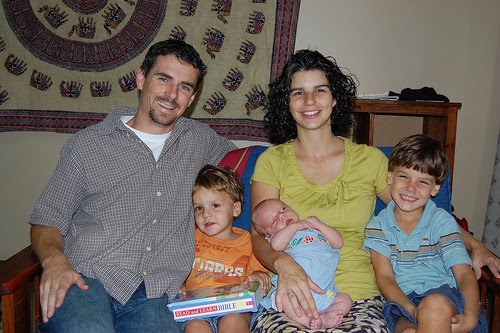One more note about the village…
(a reflection on mental illness in African society)
Sunday, while in the Sukuma village, under the mango tree with the crowd listening to a new story, provided the opportunity to observe a curious, yet beautiful thing.
There was a woman there, perhaps in her forties, with a bizarre facial expression, a face dominated by buckteeth that hung over her bottom lip and eyes that bulged out of their sockets. She walked around erratically, spitting incessantly, repeatedly adjusting her clothes in a way that exposed herself to everyone around her.
In a society where the government can’t afford to provide anything but the most basic services, there are no homes for the mentally ill and delayed, no medication, no special education options. So, the mentally disabled continue to live in the general society with everyone else.
I first noticed this woman immediately after we arrived, while a youth choir from a nearby church was singing. She was standing with them, barking out words out of sequence, attempting the choreography, spitting over and over again. During the teaching, she would parrot the teacher, and once even corrected a teacher in a way that everyone found hilarious, and as the crowd laughed, she beamed and laughed with them.
Anyways, I was completely distracted by this woman, but the Tanzanians didn’t seem to mind her being around. They did not tell her to be quiet, to go away, to stop talking during the teaching, to yield her whims to the important discussions at hand. I have been in situations where everyone wanted someone to leave or be quiet, but there was no acceptable way to do this, so instead they shun, shame, and inwardly despise a person. None of this was the case in the village.
As I considered this woman, I wondered how she made it through the famine. I mean, I have a cousin in California who worked with the mentally ill, and once the American economy slowed, their funding got cut. But this woman must have enjoyed the compassion of her neighbors even in the hardest times.
There is a terrible irony present. This is a society that traditionally views woman as second in nature to men, and acts as though they are property. As Americans (or as Christians, the first to challenge this notion), this traditional view is not acceptable. We assert that all are equal image-bearers of our creator. But we treat the useless as a nuisance, distraction, a cancer that we must programmatically remove from our midst. I think I was the only person of the scores present made uncomfortable by this woman, yet I can cite numerous theological principles and a handful of excellent books about how God is made manifest in such as these.
We focus so much on how much we know. Perhaps we have forgotten too much in the process.
(a reflection on mental illness in African society)
Sunday, while in the Sukuma village, under the mango tree with the crowd listening to a new story, provided the opportunity to observe a curious, yet beautiful thing.
There was a woman there, perhaps in her forties, with a bizarre facial expression, a face dominated by buckteeth that hung over her bottom lip and eyes that bulged out of their sockets. She walked around erratically, spitting incessantly, repeatedly adjusting her clothes in a way that exposed herself to everyone around her.
In a society where the government can’t afford to provide anything but the most basic services, there are no homes for the mentally ill and delayed, no medication, no special education options. So, the mentally disabled continue to live in the general society with everyone else.
I first noticed this woman immediately after we arrived, while a youth choir from a nearby church was singing. She was standing with them, barking out words out of sequence, attempting the choreography, spitting over and over again. During the teaching, she would parrot the teacher, and once even corrected a teacher in a way that everyone found hilarious, and as the crowd laughed, she beamed and laughed with them.
Anyways, I was completely distracted by this woman, but the Tanzanians didn’t seem to mind her being around. They did not tell her to be quiet, to go away, to stop talking during the teaching, to yield her whims to the important discussions at hand. I have been in situations where everyone wanted someone to leave or be quiet, but there was no acceptable way to do this, so instead they shun, shame, and inwardly despise a person. None of this was the case in the village.
As I considered this woman, I wondered how she made it through the famine. I mean, I have a cousin in California who worked with the mentally ill, and once the American economy slowed, their funding got cut. But this woman must have enjoyed the compassion of her neighbors even in the hardest times.
There is a terrible irony present. This is a society that traditionally views woman as second in nature to men, and acts as though they are property. As Americans (or as Christians, the first to challenge this notion), this traditional view is not acceptable. We assert that all are equal image-bearers of our creator. But we treat the useless as a nuisance, distraction, a cancer that we must programmatically remove from our midst. I think I was the only person of the scores present made uncomfortable by this woman, yet I can cite numerous theological principles and a handful of excellent books about how God is made manifest in such as these.
We focus so much on how much we know. Perhaps we have forgotten too much in the process.


1 Comments:
Well said. i appreciate your honesty in the story you told. Hope things are well for you and your family.
Post a Comment
<< Home